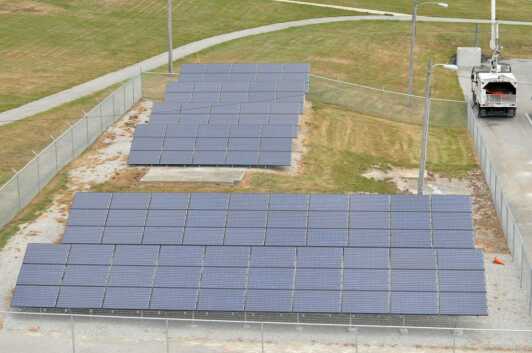The Hottest Cool Thing in Kentucky
I've heard that Bluegrass Energy, a rural electric cooperative in Central Kentucky, is considering following Berea's example by starting a solar farm. While this is not as remunerative for customers as the feed-in-tariff provision of the Clean Energy Opportunity Act, it is a huge step forward from Kentucky's deplorable enslavement to Big Coal.
Every electricity producer in the state should start a solar farm immediately. If tiny Berea can do it, everybody can do it.
From Berea Utilities:
Berea Municipal Utilities recently announced that an additional 132 solar panels are now available for lease from the Berea Solar Farm!
Currently, the Berea Solar Farm consists of 120 solar panels on the grounds of the BMU building on Harrison Street. Those panels have been leased, installed, and are now generating electricity being credited to customers’ accounts. When complete, the announced expansion will more than double the size of the solar farm. The 132 new panels will be located on the grounds of the BMU Waste Water Treatment Plant.Background and hopes for the future
Berea Municipal Utilities (BMU), with support from the City and an EECBG grant, established the Berea Solar Farm – arrays of photovoltaic (PV) panels to generate electricity. The purpose of the Solar Farm is to provide BMU customers who want to invest in local solar generation an opportunity to do so. The program invites community members to come together in moving Berea toward a better energy future.Leasing for the first 60 panels began October 25, 2011. Those 60 were leased out in 4 ½ days, and the decision was made to offer a second 60 panel array as part of the same construction project. All of the panels were leased in less than four months. A very promising beginning!One way that sustained growth in the Berea Solar Farm may occur is for participants – whether residents, small businesses, churches, or schools – to plan for a gradual increase in their panel holdings in order to reach some goal they have set for the extent to which their total electricity use is offset by their solar panels’ generation. This announced expansion of the Berea Solar Farm is the first opportunity to move toward achieving such goals.How does the leasing work?
Customers (and others) are invited to lease solar panels (no limit on number) for a one-time lease fee of $750 per panel. This one-time fee covers a 25-year period. In return, customers will receive credit every billing period for the electricity generated by their panels. In this way participating customers gain access to solar generation at an excellent price (about $3.15 per installed watt). The panels are owned and maintained by BMU and located on city property with excellent orientation to the sun and no shading.Although anyone may lease panels, only metered residential customers (class 1 or 9) and commercial customers (class 2 or 3) may receive Panel Production Credit (i.e., credit on their electric bills for the electricity produced by these Solar Farm panels). For each panel leased, a location within the BMU service territory must be specified.Who may want to lease solar panels?
Anyone, including people who don’t live in Berea! But the Berea Solar Farm would seem to be ideal for customers (and others) who want local opportunities to invest in clean energy and
- have homes, apartments or businesses – owned or rented – not well suited for solar installations due to issues with shade or directional orientation
- can’t afford the relatively large cost of installing an entire system on their property
- do not want to undertake the responsibilities of ownership
- are attracted to the idea of leasing panels but donating the billing credit to an organization such as a church or school in the BMU service area
- are attracted to being part of a community effort that will increase our energy resiliency and decrease the flow of Berea dollars out of the community
- are attracted to helping Berea demonstrate the viability of one model for how local communities in Kentucky and elsewhere to respond to the need for leadership in the face of pressing global, national and statewide energy problems.






No comments:
Post a Comment